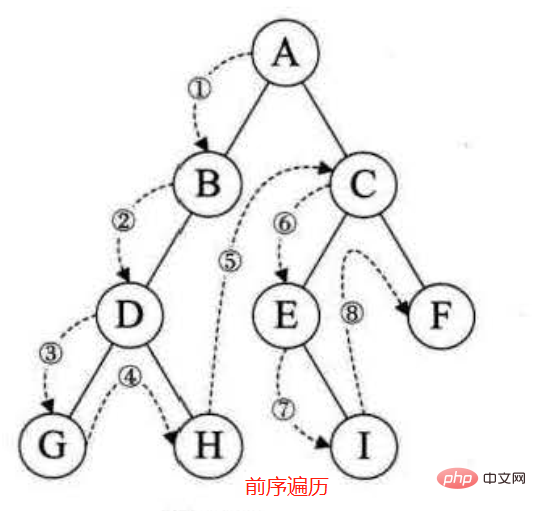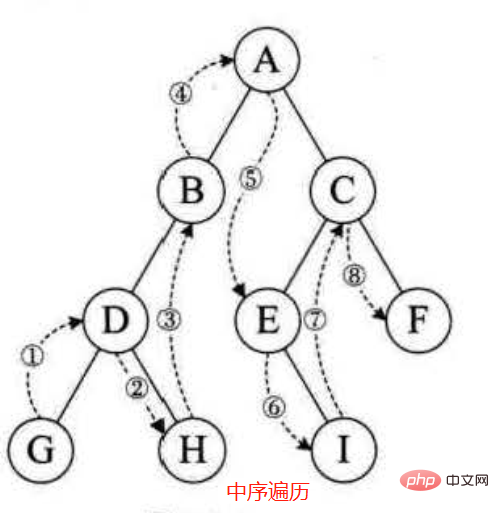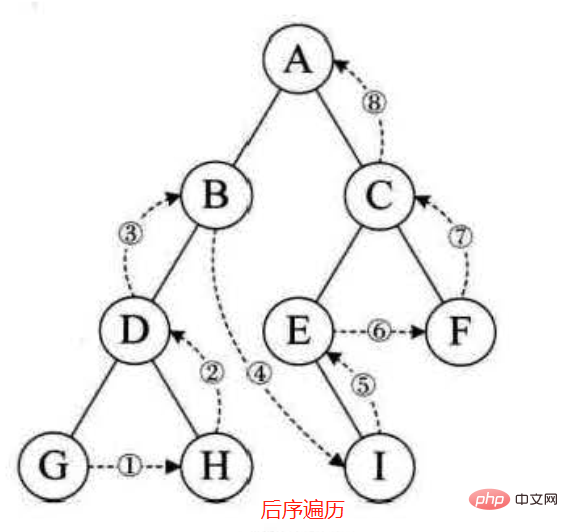 Web Front-end
Web Front-end
 JS Tutorial
JS Tutorial
 How to create and traverse a binary tree in javascript? (code example)
How to create and traverse a binary tree in javascript? (code example)
How to create and traverse a binary tree in javascript? (code example)

This article will introduce to you how to use JavaScript to create and traverse a binary tree. It has certain reference value. Friends in need can refer to it. I hope it will be helpful to everyone.
1. Let’s talk about binary tree traversal first. The traversal method:
Pre-order traversal: first traverse the root node, then the left subtree, and then the right subtree. Tree
In-order traversal: first traverse the left subtree, then the root node, and then the right subtree
Subsequent traversal: first traverse the left subtree, then the right subtree, and then the root node



The above code: mainly uses recursion
function TreeCode() {
let BiTree = function (ele) {
this.data = ele;
this.lChild = null;
this.rChild = null;
}
this.createTree = function () {
let biTree = new BiTree('A');
biTree.lChild = new BiTree('B');
biTree.rChild = new BiTree('C');
biTree.lChild.lChild = new BiTree('D');
biTree.lChild.lChild.lChild = new BiTree('G');
biTree.lChild.lChild.rChild = new BiTree('H');
biTree.rChild.lChild = new BiTree('E');
biTree.rChild.rChild = new BiTree('F');
biTree.rChild.lChild.rChild = new BiTree('I');
return biTree;
}
}
//前序遍历
function ProOrderTraverse(biTree) {
if (biTree == null) return;
console.log(biTree.data);
ProOrderTraverse(biTree.lChild);
ProOrderTraverse(biTree.rChild);
}
//中序遍历
function InOrderTraverse(biTree) {
if (biTree == null) return;
InOrderTraverse(biTree.lChild);
console.log(biTree.data);
InOrderTraverse(biTree.rChild);
}
//后续遍历
function PostOrderTraverse(biTree) {
if (biTree == null) return;
PostOrderTraverse(biTree.lChild);
PostOrderTraverse(biTree.rChild);
console.log(biTree.data);
}
let myTree = new TreeCode();
console.log(myTree.createTree());
console.log('前序遍历')
ProOrderTraverse(myTree.createTree());
console.log('中序遍历')
InOrderTraverse(myTree.createTree());
console.log('后续遍历')
PostOrderTraverse(myTree.createTree());Non-recursive traversal of binary trees
Depth-first traversal (mainly using the first-in-last-out of the stack)
Breadth-first traversal (mainly using the first-in-first-out of the queue)
//深度优先非递归
function DepthFirstSearch(biTree) {
let stack = [];
stack.push(biTree);
while (stack.length != 0) {
let node = stack.pop();
console.log(node.data);
if (node.rChild) {
stack.push(node.rChild);
}
if (node.lChild) {
stack.push(node.lChild);
}
}
}
//广度优先非递归
function BreadthFirstSearch(biTree) {
let queue = [];
queue.push(biTree);
while (queue.length != 0) {
let node = queue.shift();
console.log(node.data);
if (node.lChild) {
queue.push(node.lChild);
}
if (node.rChild) {
queue.push(node.rChild);
}
}
}Depth priority mainly uses the stack, pressing the right subtree first, then the left subtree
Breadth priority mainly uses the queue, entering the left subtree first, then the right subtree
Depth priority The traversal result is the same as the preorder traversal ABDGHCEIF. The breadth-first traversal result is ABCDEFGHI
2. Creating a binary tree. The way to create a binary tree in
1 is too clumsy. It is false to us. Build your own binary tree based on the complete binary tree model. The empty data is represented by #. As shown in the figure below, we call it an extended binary tree. We take the sequence AB#D##C## of the preorder traversal.

The above code: also uses recursion
//前序遍历得到的字符串
let strArr = 'AB#D##C##'.split('');
function BiTree(ele) {
this.data = ele;
this.lChild = null;
this.rChild = null;
}
var newTree = new BiTree('#');
function createBiTree(biTree) {
if (strArr.length == 0) return;
let str = strArr.shift();
if (str == '#') return;
biTree.data = str;
if (strArr[0] != '#') {
biTree.lChild = new BiTree('#')
}
createBiTree(biTree.lChild);
if (strArr[0] != '#') {
biTree.rChild = new BiTree('#')
}
createBiTree(biTree.rChild);
}
createBiTree(newTree);
console.log(newTree);
ProOrderTraverse(newTree)You can also use in-order traversal or post-order traversal to create a binary tree. The code generates node and Just exchange the order of codes for building the left and right subtrees
Recommended tutorial: "JavaScript Video Tutorial"
The above is the detailed content of How to create and traverse a binary tree in javascript? (code example). For more information, please follow other related articles on the PHP Chinese website!

Hot AI Tools

Undresser.AI Undress
AI-powered app for creating realistic nude photos

AI Clothes Remover
Online AI tool for removing clothes from photos.

Undress AI Tool
Undress images for free

Clothoff.io
AI clothes remover

AI Hentai Generator
Generate AI Hentai for free.

Hot Article

Hot Tools

Notepad++7.3.1
Easy-to-use and free code editor

SublimeText3 Chinese version
Chinese version, very easy to use

Zend Studio 13.0.1
Powerful PHP integrated development environment

Dreamweaver CS6
Visual web development tools

SublimeText3 Mac version
God-level code editing software (SublimeText3)

Hot Topics
 1379
1379
 52
52
 How to implement an online speech recognition system using WebSocket and JavaScript
Dec 17, 2023 pm 02:54 PM
How to implement an online speech recognition system using WebSocket and JavaScript
Dec 17, 2023 pm 02:54 PM
How to use WebSocket and JavaScript to implement an online speech recognition system Introduction: With the continuous development of technology, speech recognition technology has become an important part of the field of artificial intelligence. The online speech recognition system based on WebSocket and JavaScript has the characteristics of low latency, real-time and cross-platform, and has become a widely used solution. This article will introduce how to use WebSocket and JavaScript to implement an online speech recognition system.
 WebSocket and JavaScript: key technologies for implementing real-time monitoring systems
Dec 17, 2023 pm 05:30 PM
WebSocket and JavaScript: key technologies for implementing real-time monitoring systems
Dec 17, 2023 pm 05:30 PM
WebSocket and JavaScript: Key technologies for realizing real-time monitoring systems Introduction: With the rapid development of Internet technology, real-time monitoring systems have been widely used in various fields. One of the key technologies to achieve real-time monitoring is the combination of WebSocket and JavaScript. This article will introduce the application of WebSocket and JavaScript in real-time monitoring systems, give code examples, and explain their implementation principles in detail. 1. WebSocket technology
 How to use JavaScript and WebSocket to implement a real-time online ordering system
Dec 17, 2023 pm 12:09 PM
How to use JavaScript and WebSocket to implement a real-time online ordering system
Dec 17, 2023 pm 12:09 PM
Introduction to how to use JavaScript and WebSocket to implement a real-time online ordering system: With the popularity of the Internet and the advancement of technology, more and more restaurants have begun to provide online ordering services. In order to implement a real-time online ordering system, we can use JavaScript and WebSocket technology. WebSocket is a full-duplex communication protocol based on the TCP protocol, which can realize real-time two-way communication between the client and the server. In the real-time online ordering system, when the user selects dishes and places an order
 How to implement an online reservation system using WebSocket and JavaScript
Dec 17, 2023 am 09:39 AM
How to implement an online reservation system using WebSocket and JavaScript
Dec 17, 2023 am 09:39 AM
How to use WebSocket and JavaScript to implement an online reservation system. In today's digital era, more and more businesses and services need to provide online reservation functions. It is crucial to implement an efficient and real-time online reservation system. This article will introduce how to use WebSocket and JavaScript to implement an online reservation system, and provide specific code examples. 1. What is WebSocket? WebSocket is a full-duplex method on a single TCP connection.
 JavaScript and WebSocket: Building an efficient real-time weather forecasting system
Dec 17, 2023 pm 05:13 PM
JavaScript and WebSocket: Building an efficient real-time weather forecasting system
Dec 17, 2023 pm 05:13 PM
JavaScript and WebSocket: Building an efficient real-time weather forecast system Introduction: Today, the accuracy of weather forecasts is of great significance to daily life and decision-making. As technology develops, we can provide more accurate and reliable weather forecasts by obtaining weather data in real time. In this article, we will learn how to use JavaScript and WebSocket technology to build an efficient real-time weather forecast system. This article will demonstrate the implementation process through specific code examples. We
 Simple JavaScript Tutorial: How to Get HTTP Status Code
Jan 05, 2024 pm 06:08 PM
Simple JavaScript Tutorial: How to Get HTTP Status Code
Jan 05, 2024 pm 06:08 PM
JavaScript tutorial: How to get HTTP status code, specific code examples are required. Preface: In web development, data interaction with the server is often involved. When communicating with the server, we often need to obtain the returned HTTP status code to determine whether the operation is successful, and perform corresponding processing based on different status codes. This article will teach you how to use JavaScript to obtain HTTP status codes and provide some practical code examples. Using XMLHttpRequest
 How to use insertBefore in javascript
Nov 24, 2023 am 11:56 AM
How to use insertBefore in javascript
Nov 24, 2023 am 11:56 AM
Usage: In JavaScript, the insertBefore() method is used to insert a new node in the DOM tree. This method requires two parameters: the new node to be inserted and the reference node (that is, the node where the new node will be inserted).
 JavaScript and WebSocket: Building an efficient real-time image processing system
Dec 17, 2023 am 08:41 AM
JavaScript and WebSocket: Building an efficient real-time image processing system
Dec 17, 2023 am 08:41 AM
JavaScript is a programming language widely used in web development, while WebSocket is a network protocol used for real-time communication. Combining the powerful functions of the two, we can create an efficient real-time image processing system. This article will introduce how to implement this system using JavaScript and WebSocket, and provide specific code examples. First, we need to clarify the requirements and goals of the real-time image processing system. Suppose we have a camera device that can collect real-time image data



